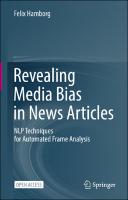Revealing Media Bias in News Articles
NLP Techniques for Automated Frame Analysis
Abstract
This open access book presents an interdisciplinary approach to reveal biases in English news articles reporting on a given political event. The approach named person-oriented framing analysis identifies the coverage’s different perspectives on the event by assessing how articles portray the persons involved in the event. In contrast to prior automated approaches, the identified frames are more meaningful and substantially present in person-oriented news coverage. The book is structured in seven chapters: Chapter 1 presents a few of the severe problems caused by slanted news coverage and identifies the research gap that motivated the research described in this thesis. Chapter 2 discusses manual analysis concepts and exemplary studies from the social sciences and automated approaches, mostly from computer science and computational linguistics, to analyze and reveal media bias. This way, it identifies the strengths and weaknesses of current approaches for identifying and revealing media bias. Chapter 3 discusses the solution design space to address the identified research gap and introduces person-oriented framing analysis (PFA), a new approach to identify substantial frames and to reveal slanted news coverage. Chapters 4 and 5 detail target concept analysis and frame identification, the first and second component of PFA. Chapter 5 also introduces the first large-scale dataset and a novel model for target-dependent sentiment classification (TSC) in the news domain. Eventually, Chapter 6 introduces Newsalyze, a prototype system to reveal biases to non-expert news consumers by using the PFA approach. In the end, Chapter 7 summarizes the thesis and discusses the strengths and weaknesses of the thesis to derive ideas for future research on media bias. This book mainly targets researchers and graduate students from computer science, computational linguistics, political science, and further social sciences who want to get an overview of the relevant state of the art in the other related disciplines and understand and tackle the issue of bias from a more effective, interdisciplinary viewpoint.
Keywords
Natural Language Processing; Deep Learning; Media Bias; Content Analysis; Frame Analysis; Social Aspects of Computing; Information RetrievalDOI
10.1007/978-3-031-17693-7ISBN
9783031176937, 9783031176937Publisher
Springer NaturePublisher website
https://www.springernature.com/gp/products/booksPublication date and place
Cham, 2023Imprint
Springer Nature SwitzerlandClassification
Natural language and machine translation
Machine learning
Media studies
Language: history and general works
Political science and theory


 Download
Download Web Shop
Web Shop